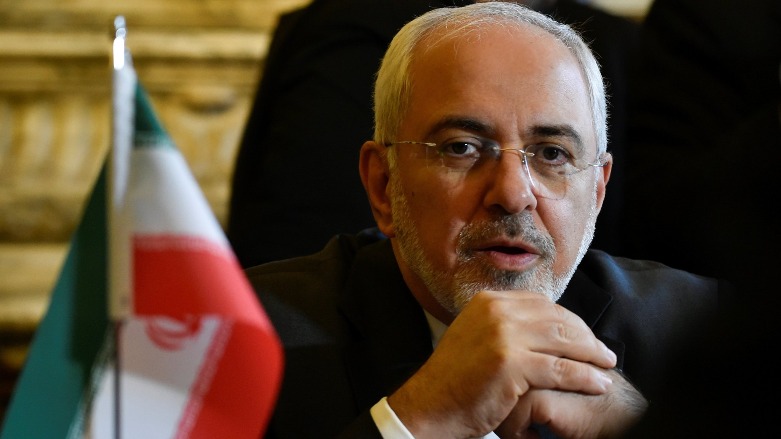Zarif: Soleimani, Khamenei determined Iran’s foreign policy; Russia opposed nuclear deal

WASHINGTON DC (Kurdistan 24) - In a lengthy, bombshell discussion, Iranian Foreign Minister Mohammad Javad Zarif, complained of his lack of control over the making of Iranian foreign policy, which, he said, was really set by Qassim Soleimani, who headed the Qods Force of Iran’s Islamic Revolutionary Guard Corps (IRGC) until his assassination in January 2020, as well as by Iran’s Supreme Leader, Ayatollah Ali Khamenei.
Zarif also revealed that Russia, working with Soleimani, had sought to sabotage the 2015 nuclear deal, formally known as the Joint Comprehensive Plan of Action (JCPOA), “because it was not in Moscow’s interests for Iran to normalize relations with the West,” according to a New York Times report, published on Sunday.
Zarif’s statement runs contrary to the view of the Biden administration, as it seeks to restore the JCPOA. It maintains that countries like Russia and China share America’s strong commitment to preventing the proliferation of nuclear weapons. However, Zarif’s remarks suggest that Moscow puts a higher priority on gaining advantage in its rivalry with Washington than it does in blocking the spread of nuclear arms.
The leaked audiotape was part of an oral history project meant to document the achievements of Iran’s current government under President Hassan Rouhani, who assumed office following Iran’s 2013 elections. Iranian presidents are limited to two four-year terms, so Rouhani will step down in August, following the next round of elections in June.
The interview was conducted in March, according to Iran International, a London-based Persian media outlet, which first reported the story and shared the tape with the Times.
It is unclear who leaked the tape or why, as the Times noted. A spokesman for the Iranian foreign ministry “did not dispute the authenticity of the recording, but questioned the motive for the leak,” it said.
The leaked sections of the audiotape portray Iran’s elected officials, including Rouhani, as largely powerless figures, who carry out policies for which, the broad parameters, at least, are set by others.
Suggesting a US misunderstanding of Tehran’s political system, in 2013, Time magazine, after Rouhani was first elected president, named him as one of the world’s 100 most influential people.
But that is quite wrong, according to the Iranian Foreign Minister.
“In the Islamic Republic, the military field rules,” Zarif stated. “I have sacrificed diplomacy for the military field, rather than the field servicing diplomacy.”
According to Iran International, Zarif described his role in determining Iran’s foreign policy as “nil.”
On Feb. 1, as the Biden administration began its efforts to revive the JCPOA, Zarif, in an English-language interview with CNN, suggested that the European Union’s foreign policy chief, Josep Borrell, could “choreograph” the steps to be taken by the US and by Iran to return each side to compliance with the nuclear accord.
Following those remarks, however, Khamenei “forcefully rebuked” Zarif, as that was not Iran’s official line at the time, which was, in fact, to reject them. However, it should be noted, that indirect talks on reviving the JCPOA did, indeed, begin earlier this month.
For all his criticism of Soleimani, Zarif did make clear his importance. “By assassinating him,” the Times reported, “the United States delivered a major blow to Iran, more damaging than if it had wiped out an entire city in an attack.”
Zarif’s understanding of Iranian politics carries both positive and negative implications for the ongoing negotiations over reviving the JCPOA.
On the positive side, it suggests that Iran’s upcoming elections will not significantly affect the course of the talks. The Iranians doing the negotiating are not the individuals making the decisions.
On the other hand, the Biden administration has said—repeatedly—that once it has succeeded in restoring the JCPOA, it will use the remaining, non-nuclear sanctions, like those imposed for Iran’s support for terrorism, to address other areas of Iran’s malign activities, including its ballistic missile program and its support for proxy forces, including in Iraq.
Zarif’s comments, however, suggest that Tehran will likely reject such restrictions, because its military activities are very important to those individuals who really hold power in Iran.
“Under Soleimani’s influence, [Zarif] had to further a diplomacy that would serve Iran’s interests in its military operations in the region,” Iran International reported, as he “stressed that Iran always attached priority to its war operations.”
Editing by John J. Catherine
